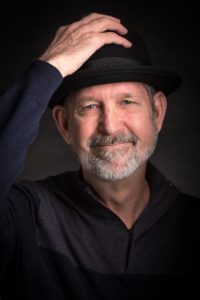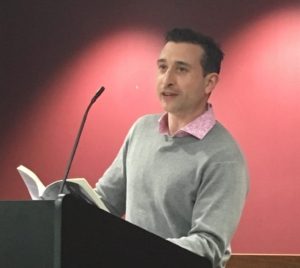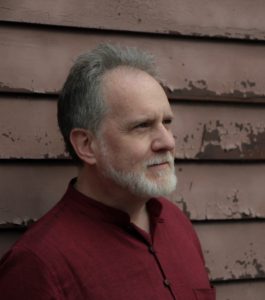FOW FORUM
Subscribe to the Friends of Writers Forum and receive notifications of new posts by email.
A brief address to the Warren Wilson Winter 2024 graduates
 Thank you for that kind introduction. And thank you, too, for all those who made this residency possible; they can’t be thanked enough: Alyssa and Caleb, Alex and Carlos, Deb and Rita. Let’s also thank the YMCA Blue Ridge staff who fed us, banked fires in the cold, and kept us safe and dry.
Thank you for that kind introduction. And thank you, too, for all those who made this residency possible; they can’t be thanked enough: Alyssa and Caleb, Alex and Carlos, Deb and Rita. Let’s also thank the YMCA Blue Ridge staff who fed us, banked fires in the cold, and kept us safe and dry.
I want to save my biggest thanks, though, for the beloveds. The partners, the friends, the children, the parents, in the audience, out in the world, all of you who saw the graduates through. We spend graduation day celebrating the graduates and rightly so, but we should spend every day celebrating you, the people who made it possible.
You know who you are. You made dinner the night before a packet was due. You delivered tea and soothing words when the thesis wasn’t going well. You shoveled the driveway clear of snow at 5 a.m. in Wisconsin while your partner was in North Carolina, and then shoveled it the next day, and the next, and then, though it was hard to hold the phone since you were developing frostbite, you listened attentively when your writer called from Blue Ridge and said things were going ‘okay.’ That’s great, you said, and they said, ‘you don’t get it,’ and you didn’t, because you didn’t really have time to, because your daughter’s school was calling: she has a stomachache. It’s probably just gas, your writer in North Carolina texted, adding, BTW, I am EXHAUSTED #dance #gymnight #cocoanight #party, hashtag something else, who knows, you’ve stopped reading, it turns out it was appendicitis, and when you finally do text back your writer in North Carolina, you’re sitting on the couch with a glass of your own favorite anesthesia, using your final grams of strength to pick out, ‘no don’t come home, she’s fine now, we’ll see you soon enough anyway.’
Or that’s what my wife texted toward the end of a winter residency seven years ago, and my daughter did make it through her emergency appendectomy just fine without me, the neighbor helped with the snowblower, AAA was super handy when the car didn’t start, and –
Can I just say, though—spouses, partners, kids, parents, friends in the audience today? The dances, the receptions, the workshops, the bookshops, the thesis interviews, the lectures, the grad classes, the conversations that go so late into the night, that—look, it’s morning!—it really is exhausting, this experience. And wonderful.
Especially today. I once got into a debate that, like many of the best conversations at Warren Wilson, ended without a clear answer. The debate was this: what part of the Warren Wilson MFA Program for Writers is the best. Not just good or great, but the best, the very peak.
Again, this may be a place where I must explain to the friends and family here why this is a debate. If you’ve spent money and time to travel all the way to western North Carolina to see someone graduate, this better be the best part of the program. At what school is graduation not?
Maybe…this one. Ask a dozen Warren Wilson grads for the best part of the whole experience and you’ll get a dozen answers. More than a few will say, ‘the call.’ When Deb, and now, Rita, called you to say you were admitted, and said the magic word, “congratulations,” and said it again when you insisted that it couldn’t be true.
Other people will tell you the best part is the opening lecture, everyone buzzing with excitement. Others will tell you about a favorite class or workshop, one that left them mouths agape, forty-five to sixty minutes that changed everything for you.
Some will say the very best part of the Warren Wilson experience was the part they were least looking forward to: the dreaded essay. Some will say the best day was the day the essay was done.
Or, no, it was the thesis, the day when, armed with a mug of coffee, a pencil, and a tenuously cleared calendar, you went through your thesis a final time and allowed yourself to think—shyly, not going to shout about it, but you know, from a certain angle, in this early light—this thesis was all right. You did good. This was time well spent.
Family, friends, that day when your writer came downstairs, circles under their eyes, not necessarily able to form words—and apparently unable, for weeks now, to do a single basic chore around the house—that day when they came downstairs with a quiet smile on their face and gave you a hug, that may have felt like the best day.
Well, it wasn’t.
The best day is what some fear is the worst day. It’s not.
The best part of Warren Wilson is tomorrow.
The best day is the day you leave, walking stick in hand, and return to that other life. To be clear, it’s not easy. It feels lonely. True, it feels amazing to read a book and not have to wrap your head around how you’re going to get an annotation out of this—and two others besides in the next few weeks—but it also feels a little nostalgic, a little empty. Where is everyone?
The best part is that they’re here. The friends you’ve made, the readers you’ve gained, they go with you, stand with you, read with you, write with you. Then there are the other friends you may not even know you have, the 1,150 Warren Wilson graduates worldwide, who, the instant you discover your connection—you’re a Wally, too?—will widen their smile. I guarantee this. In Paris. In Shanghai. In New York, Los Angeles, Miami, Boston, and even Milwaukee, someone already knows you, gets you, eagerly roots for you in all that you do.
Partners, parents, siblings, children, uncles and aunts and grandparents and friends, your writer is going to be a little confused tomorrow morning. It’s going to be the first day in a long while when they wake up and say, “what’s next?”
Here’s what you tell them—what’s next is the best part, the very best part. Getting back to work. Back, when all of us have your back.
Congratulations to you, then, supporters, for getting your writer to the cusp of this wonderful new life, and congratulations to the graduates, too. You have taught us all what ‘best’ really means.
Liam Callanan
Black Mountain, NC
January 2024
A poem consisting of many voices
This poem is a cento, consisting entirely of lines from other poems, compiled here in chorus. Some punctuation and tenses have been changed. I’m grateful to these poets for their lines, each attributed at the bottom of the page.
Fiction faculty member Kevin McIlvoy was recently featured in The Rupture. Read an excerpt of “Blue Squill” below:

Blue Squill
Grateful for his body’s productiveness, Mr. Jordan Jabbok took three satisfying morning walks in order to piss a circle around his newly planted blue squill bulbs encircling last season’s blue squill plants orbiting his weeping cherry tree sending its large but tender roots under a ring of curved red bricks red-golden now and fringed by high blue larkspur rising from within a circle of squill planted in other seasons, and smelling like strong rat poison when they are in bloom.
The long masterful piss on a daily basis was the expressive performance of the retired ballroom dance instructor.
“This is how you begin?” my restless sister asks. Adept at mocking biblical jargon, she says life permits two choices: “You can ask, ‘Why is it so?’ or you can say, ‘It is so.'”
Certain tales answer the former question.
Certain tales, much smaller, embody the latter. This one is of that kind.
Read the rest of this story here: https://www.therupturemag.com/rupture/blue-squill
Fiction faculty member Debra Spark was recently featured in Barnard Magazine. Read an excerpt of Spark’s essay about Alicia Jo Rabins (Poetry ’09) below:

Her Many Muses
Not long after the Bernie Madoff scandal broke, Alicia Jo Rabins ’98 started a yearlong artist residency on an empty floor of a Wall Street high-rise. At first, Rabins — a poet, musician, and Jewish educator — wasn’t sure what she’d produce. This was a time to be creative, but her mind kept turning to the disgraced financier who defrauded thousands of people. Here she was in the heart of the financial district — in his environs. How to understand the man who once operated the largest Ponzi scheme in history? And what about the individuals and families he impacted? Why was she even so curious?
When Rabins is interested in something, she has a tendency to dive in deep. In 1994, she arrived at Barnard, an accomplished violinist who wanted to be a poet. She left as a Phi Beta Kappa whose friendship (and subsequent study) with a Modern Orthodox classmate spurred a desire to immerse herself in Judaism. Previously a more-or-less-secular Jew, she moved to Jerusalem for a year of study but wanted more, so she stayed for a second year, then returned to New York and eventually earned a master’s in Jewish women’s studies at the Jewish Theological Seminary.
In 2008, she was still in the habit of immersing herself in all-consuming subjects, only now that was Madoff. In the end, she says of her obsession, “I did what any artist does when something drives them crazy — I made it into art.”
Read the rest of this essay here: https://barnard.edu/magazine/spring-2022/her-many-muses
Poetry faculty member C. Dale Young was recently featured in The Rupture. Read an excerpt of “Henceforth” below:

Henceforth
after Jaime Gil de Biedma
All of my life, I could barely remember it. As after a dream,
I stared at the clouds floating above the sea and thought
of rain, and it rained. Later, when I learned the word Desistare
and used it with intent, I found I could stop the rain.
“All of my life.” It sounds so odd to say that out loud.
But strange thing after strange thing transpired. Imagine.
The day ends in a flash of color and wonder, and the sea
slowly becomes the night sky. You may or may not
have feelings when this happens. I cannot speak for you.
Read this poem in its entirety here: https://www.therupturemag.com/rupture/henceforth
Poetry faculty member Jason Schneiderman was recently featured on the podcast The Slowdown. Read an excerpt of “In the End You Get Everything Back (Liza Minnelli)” below:

In the End You Get Everything Back (Liza Minnelli)
The afterlife is an infinity of custom shelving, where everything
you have ever loved has a perfect place, including things
that don’t fit on shelves, like the weeping willow from
your parents’ backyard, or an old boyfriend, exactly as he was
in your second year of college, or an aria you love, but without
the rest of the opera you don’t particularly care for.
My favorite joke: Q: You know who dies? A: Everyone!
Because it’s true. But ask any doctor and they’ll say that
prolonging a life is saving a life. Ask anyone who survives
their surgeries, and they’ll say yes, to keep living is to be saved.
Read (and hear) this entire poem here: https://www.slowdownshow.org/episode/2022/04/15/654-in-the-end-you-get-everything-back-liza-minnelli
Poetry alum and faculty member Daniel Tobin was recently featured in On the Seawall. Read an excerpt of “Hand,” a translation of Rilke, below:

Hand
after Rilke
Look at the little mouse
baffled and afraid
in the room, lying
for twenty heartbeats
in a hand, a person’s hand, one
held out freely, firmly,
to keep it safe.
Read the rest of this translation, and three others, here: https://www.ronslate.com/full-throttle-hand-we-when/